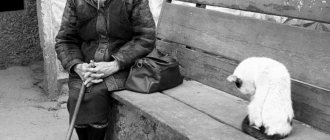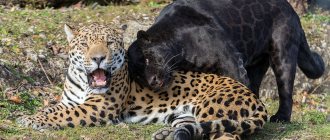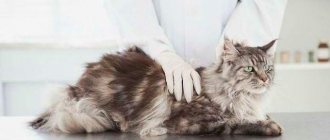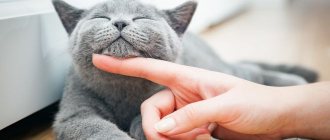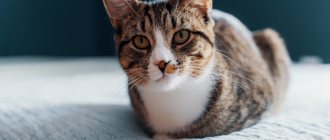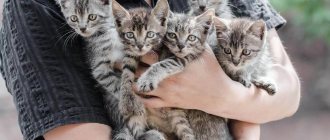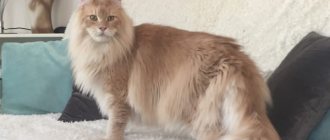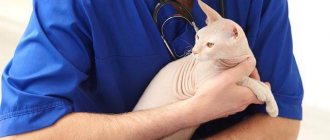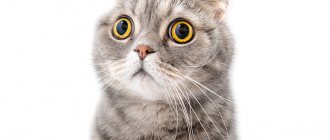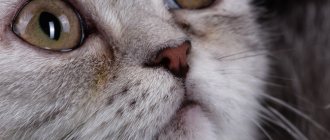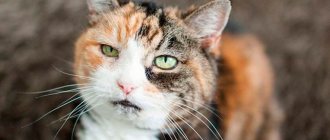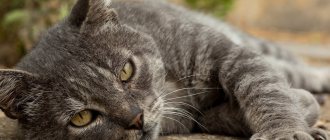Cats are amazing creatures: even if years pass, they have apparently drunk from the fountain of endless youth. However, although they always look young and glowing, cats age just like any other living thing.
Although we don't realize it, cats actually grow faster than other animals. In fact, a cat is already considered an adult when it reaches the age of 7 years. Just like with humans, when a cat reaches this age, its health begins to show signs of change and aging.
It is important for us, as human companions to our pets, to know when this phase begins so that we can take appropriate measures and provide the best lifestyle for your animal. Read this new article and learn 5 signs of old age in cats.
Hearing loss
Hearing loss does not occur in old age in all cats, but it is very common. If you call your cat several times and she doesn't respond, her hearing may not be as good as it used to be.
There are different degrees of deafness, with some cats having only a slight degree. Other older cats may become completely deaf. If you notice any major changes in your cat's feelings or behavior, you will need to contact your veterinarian to rule out another, more serious health problem.
The same thing happens with loss of vision and smell. The breakdown of your pet's senses will lead to attention deficits, and he may begin to become clumsy in his movements and show changes in his mood, so he may be somewhat irritable.
We know that changes inevitably occur in the body of an aging animal. Animals are different species and age differently. In some, for example, in dogs of decorative breeds, age first of all affects the activity of the heart, and in cats the kidneys suffer. We can help our animals adapt to these changes in a variety of ways: supporting them with various medications and nutritional supplements, diagnosing potential diseases in the early stages, and changing their environment. Even communicating with aging four-legged friends needs to be different. Change in nutrient requirements. As dogs age, their metabolism changes and their need for calories decreases. In cats, the energy requirement remains virtually unchanged throughout adult life. Obesity is a major problem for cats in their prime, but older cats tend to lose excess fat. Studies have shown that older cats, like young kittens, do not have the ability to absorb fat.
Changes in skin and hair. Just like humans, cats' coats begin to gray as they age, especially noticeable in black cats. The coat becomes thinner and more lifeless, however, this can be a sign not only of aging, but also of illness or lack of nutrients. Adding fatty acids to the diet helps restore shine to the coat. If changes in fur are very noticeable, then you should take your cat to the vet.
Aging cats may require more careful grooming, with special attention paid to the anal gland area. Grooming is a great way to spend a lot of quality time with your cat. Most likely she really likes your increased attention. It will also help prevent matting, which is a common problem with aging cats. When brushing or petting your cat, pay attention to any swelling, lumps, or open wounds and immediately consult your veterinarian about this.
The skin of an aging animal may also become thinner, less elastic, and more susceptible to injury. Wounds on the skin of older cats usually take longer to heal. One of the problems in older cats can be dry skin, and here again fatty acid supplements will be useful, brushing will help stimulate the sebaceous glands and distribute natural oils throughout the coat.
Brittle claws. Aging cats become more fragile. They should be trimmed more often, as older cats sharpen their claws much less often than young cats.
Decreased mobility. Arthritis is common in aging cats, especially if they suffered joint damage earlier in their lives. Just like in humans, arthritis in cats can take many forms, ranging from mild joint stiffness to severe musculoskeletal problems. It happens that cats have difficulty jumping into their favorite places or going up and down stairs.
Cats are sensitive to many anti-inflammatory drugs, such as aspirin and acetaminophen. Do not give your cat anti-inflammatory or pain medications unless they have been prescribed by your veterinarian. And if you did, then strictly follow the indicated dosage.
Older cats lose muscle mass and muscle tone, and if the muscles are not exercised, they lose strength and elasticity. Cats find it difficult to move and for this reason they move less - a vicious circle begins. Exercise is very important for healthy muscles, heart and digestive system. Curiosity is common even in old cats, so different boxes, bags, slow toys and movies for cats will help to stimulate them. Replace steps with gentle slopes and provide a litter box with low sides for a cat that has difficulty moving. Place the food and litter box in the area of the house where your cat spends the most time.
Dental diseases. Dental disease is one of the body changes that is most commonly seen in aging cats. Research shows that 70% of older cats suffer from gum disease. Regular dental care, including brushing, will help keep these diseases to a minimum. If you don't take good care of your cat's teeth, they can develop serious diseases as they age, which can lead to life-threatening complications. The dental care program includes brushing, regular vet checks, and professional cleaning when necessary.
Weakened intestinal motility (constipation). As cats age, the movement of food through the gastrointestinal tract slows. This can cause constipation, which is common in older cats. Constipation is common in cats that experience pain when defecating, such as those with arthritis or anal gland disease. Being less active and drinking less fluids can also lead to constipation. Hairballs in older cats can cause serious problems if the cat is constipated. Your veterinarian can help you determine whether your cat should be given hairball medication or soak her food to prevent constipation.
Constipation can also be a sign of other serious illnesses and your cat should definitely be seen by a veterinarian.
Weakening of the immune system. As a cat ages, its immune system does not function as effectively, and older cats are prone to infections. And infections at this age are difficult to tolerate, so get your cat vaccinated in a timely manner.
Decreased cardiac activity. As a cat ages, a cat's heart works less efficiently and pumps less blood over a given period of time than when it was young. Cats can develop a heart disease called cardiomyopathy. To diagnose heart disease, methods such as X-ray, ECG, and echocardiogram are used. Depending on the diagnosis, various medications are prescribed.
Reduced lung volume. As an animal ages, the lungs also lose their elasticity. For this reason, the ability to saturate the blood with oxygen decreases. Older cats may be prone to upper respiratory tract infections.
Deterioration of kidney function. Older animals have an increased risk of kidney disease. This may occur due to changes in the kidneys themselves or as a result of dysfunction of other organs, such as the heart, which, if not functioning properly, reduces blood flow to the kidneys. Kidney function can be checked with a blood or urine test. These tests will show whether there is any kidney disease before obvious symptoms appear. The most common sign of kidney disease that owners notice is an increase in water consumption and urination, but this usually occurs when the kidneys are already 70% damaged. If the kidneys are not functioning properly, then to help the body get rid of waste products, you need to use various medications and diet. To prevent dehydration, you need to give more fluids. Before prescribing anesthetics, it is recommended to do a blood test to determine the disease.
Deterioration of liver function. Although the liver has a unique ability to heal itself, it ages just like any other organ in the body. Its ability to purify the blood and produce various enzymes and proteins gradually decreases with age. Sometimes enzyme levels can be elevated in an animal that appears to be healthy. On the other hand, some animals with liver disease have normal levels of enzymes in their blood. So, based on the test results, it is difficult to judge whether the disease actually exists.
Since all medications and anesthetics affect the liver, the dose of these medications should be reduced if the liver is not functioning well. Before anesthesia is administered, a blood test should be performed to determine if the animal has liver problems.
Changes in the activity of glands. During the aging process, some glands produce less hormones, while others, on the contrary, produce more. Hormonal imbalances, especially hyperthyroidism, are common in older cats. Older cats also develop diabetes. A blood test helps diagnose these diseases. Many of them are amenable to medication and other types of treatment.
Changes in the mammary glands. Cats that are not spayed may develop lumps in the mammary glands due to infiltration of fibrous tissue and may develop cancer. Unfortunately, approximately 85% of mammary tumors in cats are malignant. Older cats should have their mammary glands examined regularly.
Changes in behavior. As cats age, they lose their ability to cope with stress and their behavior changes as a result. Aggression, fear of noise, and urinary and fecal incontinence may develop or worsen in older cats. Various medications and behavior modification techniques can help resolve these behavior problems.
Do not adopt a kitten or other animal if you have an old cat, this will be stressful for her. It is best to adopt a kitten while the older animal is still in good shape, is not sick and has normal vision and hearing.
Increased sensitivity to temperature levels. Old cats lose the ability to thermoregulate their body. This means they are less able to adapt to temperature changes. Cats that were able to handle the cold well when they were young are no longer able to do so. Monitor the ambient temperature and make adjustments if necessary to keep your cat comfortable. You may need to move her bed closer to a heat source or purchase a heated bedding if you live in a cold region.
Hearing loss. Some cats experience hearing loss as they age. Minor hearing loss in cats is difficult to detect; very often, hearing disappears almost completely before the owner notices it. The first sign of hearing loss may be aggressive behavior. The cat does not notice the approach of a person, is frightened by the touch and reacts instinctively to this. Hearing loss is usually an irreversible process, but by making some adjustments in your behavior, you can help your pet adjust. You can use light as a signal (when entering a room, quickly turn the light on and off several times). Cats with hearing loss sense vibration, so clapping your hands or stomping on the floor will alert your cat to your presence.
Eye diseases and vision loss. Cats can lose their vision at any age. You will notice that the cat does not follow the toy with its eyes as it moves across the floor, it has difficulty finding its food bowl, and bumps into furniture if it is moved from its usual place. Any changes in vision or appearance of the eye require immediate attention to your veterinarian. An ophthalmological examination should be included in the regular medical examination program.
A variety of changes can occur in the body of aging cats. In some cats they are more pronounced than in others. Age-related changes in some animals can begin at a relatively young age. There are many ways to help your cat adjust to these changes.
You need to examine your aging cat more carefully. Don't chalk up changes in your cat's activity or behavior to "old man quirks." Many of these changes may indicate serious medical conditions. If you have any doubts, consult your veterinarian and discuss any questions you have during your routine examination.
Changes in eating habits and weight
As your cat gets older, you will find that she eats less or more slowly than before, and her previous appetite will disappear. This happens because over time the digestive system slows down, which can also cause problems with constipation. As digestion becomes slower and more difficult, your cat may also lose weight. If you notice this sign of aging in your cat, it is necessary to adjust the food portions and make changes to her diet.
On the other hand, because older cats are less active, they can gain weight easily and may even become obese. Physical changes are very relative. The situation can get worse if you don't watch out for these symptoms, as it could also be a symptom of diabetes. A common symptom of diabetes in cats is constant eating throughout the day and constant thirst. If you notice this, consult your veterinarian as soon as possible.
Age at which cats become old
On average, an animal lives from 12 to 15 years. Previously, to determine age, 1 year was considered 7. Later, this algorithm was adjusted. Veterinarians have noticed that there is no linear correspondence. Now the year of a pet’s life, by analogy with a human life, is calculated differently, as the table shows:
| Years of a cat's life | Appropriate for a person's age |
| 1 | 18 |
| 2 | 25 |
| 3 | 30 |
| 4 | 34 |
| 5 | 37 |
| 6 | 40 |
| 7 | 45 |
| 8 | 50 |
| 9 | 54 |
| 10 | 58 |
| 11 | 60 |
| 12 | 62 |
| 13 | 66 |
| 14 | 70 |
| 15 | 75 |
Timely treatment of an animal's ailments will prolong its life.
The bifurcation point is considered to be the age of 7 years, when a still mature cat becomes infertile, provided that it is not sterilized. If you provide adequate care for an old cat, treat illnesses promptly and correctly, then your pet will live to a ripe old age, which by human standards corresponds to 105 years. It is important to notice age-related changes in time, which are characterized by specific symptoms.
Slowness of movements
Is your cat not as restless and active as before? This may be a sign of old age. As cats age, they become lazy: they prefer to sleep all day rather than chase mice.
It will also be more difficult for them to move around and perform activities that they did before. The cat will continue to play, but with less intensity, and will become bored with moving faster. An older cat will move more forcefully and less smoothly, which may indicate that there is a problem with the joints and muscles, especially in the hips and hind legs. These are all typical signs of old age.
In old age, comfort and lack of stress are important
For comfort, an aging cat needs:
- a soft lounger or house in a quiet but easily accessible place;
- extra warmth on cool days;
- ramps (stands) to easily climb onto your favorite chair or windowsill;
- food and water in shallow bowls;
- a simple tray in an accessible place.
Calm, just calm!
Nervousness does not add health to anyone - neither people nor cats. The elderly do not want change; they are better off living in the familiar world. For example, you shouldn’t change your cat’s favorite old blanket. Animals in old age have a hard time getting used to everything new, and it is better not to disturb their usual course of life.
If a cat considers itself the rightful owner of the entire territory and has never lived with other pets, then you should not bring a kitten or puppy into the house. This can cause severe stress. It is unlikely that the animals will become friends; perhaps the cat will simply learn to tolerate the new guest.
Dental problems
Older cats' teeth weaken with age. They may be more sensitive, and if they have a tendency to drool, this may precipitate problems of gingivitis or herpetic gingivostomatitis, in other words general inflammation of the gums.
Just like humans, some cats may even lose teeth, which interferes with the feeding process. To help your cat, you should replace her regular dry food with a more natural one and consider seeing your veterinarian for a thorough oral hygiene routine. You will notice signs that something is wrong with your cat's teeth when you brush them.
Remember that older cats require more care than older cats and require special attention to their diet and health. This article is for informational purposes only and is not intended to prescribe any veterinary treatment or diagnosis. We invite you to take your pet and visit a veterinarian if they are suffering from any distress or pain.
How to help your pet meet old age with dignity?
As soon as the cat is seven or eight years old, it is necessary to switch to special food for older cats. Industrial food already contains the necessary elements, vitamins and a balance of fats and proteins for older cats. If you feed natural food, consult your doctor: he will select a suitable diet. Monitor your pet's weight. The cat should not be too thin, but excess weight is also not necessary.
With old age, chronic diseases appear, so it is necessary to regularly show the animal to a veterinarian. Pay closer attention to your pet's condition and behavior. Do not forget that an elderly cat has a weakened immune system, so protect your pet from drafts and make sure he is warm.
Clean your cat's ears and comb his fur to collect numerous dead hairs and prevent tangles. Show more care and attention. Stroke your pet, talk to it, call it to your lap. It is important for an old cat to feel safe.
Photo source: pixabay.com
Signs of a cat dying of old age
Almost all cats leave home before they die, so owners don’t have to see them suffer. However, approaching death can be predicted by certain symptoms.
- A decrease in appetite should alert owners. Before death, pets eat little or refuse food altogether. You can tell that a cat’s body does not accept food by the untouched food in the bowl, the absence of excrement in the tray, darkening of the urine, and if the feces have a reddish tint.
- Before death, cats' breathing becomes noticeably more difficult. The inhalation is longer, shortness of breath is observed. If breathing is intermittent, barely noticeable, it is a symptom of imminent death.
- The heart beats weakly, which can be determined by placing your palm on the cat's heart area.
- An unpleasant odor emanating from a dying cat. The body is no longer able to remove toxins, so it accumulates them, and they, in turn, poison the pet.
- Decreased body temperature. If you don’t have a special thermometer at hand, you need to touch the animal’s paw pads.
- Cold paws are a bad symptom.
Diseases of cats in old age largely depend on such features of the body as a decrease in the sensation of thirst, which leads to pathological changes.
Wool and skin
Aging cats experience a number of problems with their skin and fur. It should be understood that the changing condition of the coat not only looks unsightly, but also brings a lot of discomfort to the animal:
- Thinning, excessive dryness and flaking of the skin are accompanied by severe and frequent itching. Due to frequent and severe scratching, abrasions and wounds may appear on the epidermis.
- Long-term healing of skin lesions.
- The coat becomes dull, may turn gray and fall out.
- Formation of multiple mats.
How to help ? The owner will be required to perform certain actions:
- Frequent and thorough combing of the coat with special brushes. When combing a fur coat, it is recommended to carefully inspect the skin each time. If any lumps or bumps are noticed on it, this is a reason to immediately contact a veterinarian, since as cats age, there is a high risk of developing cancerous tumors that last for a long time without any symptoms.
- Adding vitamins to the diet to help normalize the condition of the coat and its appearance.
- Treating wounds with disinfectants and applying healing ointments. If the wound on the skin is deep and the cat often scratches it, use topical preparations containing an antibiotic.
Claw care. The animal's claws require no less attention. With age, the nail plate becomes thin and brittle. At the same time, the claws continue to actively grow, but the pet stops regularly grinding them down. Owners need to monitor the length of the cat’s claws and, if necessary, cut them with special scissors.
Picky character
The character of aging cats very often deteriorates, just like that of people, and, most likely, the reason for this lies in the acute need for love, which we will talk about in the next paragraph.
Many owners notice how, with age, a cat becomes much more jealous and selective of people - she will no longer rush to every guest who comes to your apartment, but will prefer to spend time on the lap of her pet.
Doubts become the norm
We all know that with age, people increasingly doubt before making decisions, either life experience does not allow them to do rash things, or they constantly think about whether they have enough strength.
The situation is the same with cats: with an aging pet, owners are increasingly observing his doubts: either the pet no longer quickly jumps onto the table without any doubts, or before jumping off, it will take longer than usual to mark the most favorable place for itself.
Urinary system.
Changes in the upper urinary tract caused by aging:
1) kidneys are reduced in size,
2) the number of active nephrons in the kidneys is reduced,
3)decrease in glomerular filtration rate,
4) decreased excretion through the renal tubules,
5) decreased reabsorption (reabsorption) in the renal tubules.
All these changes occur with the development of Chronic renal failure, which, with early diagnosis, can slow down or stop the development of the disease.
Diet therapy for chronic renal failure:
Animals must be given food that meets the following requirements:
1) High calorie content,
2) the protein content in the feed should be low (proteins should be biologically complete),
3) Low phosphorus content,
4) Low sodium content,
5) Elimination of the possibility of developing acidosis
• Urinary problems.
As animals age, they may experience uncontrolled urination; urinary incontinence occurs more often in older female dogs. Basically, this is a disorder of the urethral sphincter mechanism. The tone of the urinary canal can be increased by using Phenylpropanolamine, trade name Propalin.
• Prostate diseases.
The disease is more common in dogs. Clinical signs are similar in all cases:
1) Pain in the pelvic region of the abdominal cavity during palpation or movement, as well as during bowel movements.
2) constipation.
3) difficulty defecating or urinating.
The diagnosis is made through clinical examination, ultrasound, and radiography.
Treatment: for hyperplasia, castration is indicated. In dogs that cannot undergo anesthesia, conservative therapy is used.
Why do older animals lose their appetite?
The fact that an older pet doesn't eat much is a cause for concern for most cat owners. However, as a rule, this is a normal phenomenon and there is no cause for concern. When these animals begin aging processes in their bodies, their perception of the taste and smell of food becomes dull. In addition, four-legged “retired” animals, due to natural changes in the body, have a deteriorating ability to absorb it.
With age, representatives of this family stop moving actively, so they require much less energy, which is precisely what food provides. If a tailed pet that has passed the 11-12 year mark eats little, but generally does not look emaciated, there is no reason to worry.
In older cats, the condition of their teeth and gums often deteriorates. Inflammation in the oral cavity leads to the fact that the pet tries to eat less or refuses food altogether. At the same time, he is losing a lot of weight and looks exhausted. In this situation, you should, at the first opportunity, show your four-legged pet to a veterinarian, who will select a new diet for the animal, consisting of ready-made food or self-prepared dishes that do not cause discomfort in the cat when eating, causing him to refuse to eat.
